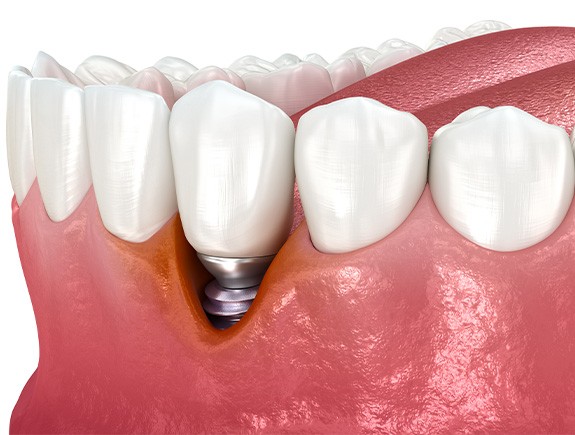Dental Implant Failure & Salvage – West Caldwell, NJ
Renew Your Smile’s Health & Function
When you decide to get dental implants, there is no need to be overly worried that something will go wrong — they are successful in more than 95% of cases! However, it must still be acknowledged that in rare instances, dental implant failure can occur. If you ever believe that is happening to you, call our West Caldwell team right away. We will do all we can to figure out the cause of the problem and find a dental implant salvage solution that will renew your smile’s health and function.
Why Do Dental Implants Fail?

The most common cause of dental implant failure is an infection known as peri-implantitis. It occurs when harmful bacteria attack the bone and gums around an implant. Eventually, the damage can become so severe that the implant loses its base of support. In many cases, poor oral hygiene habits contribute to the development of peri-implantitis.
Other potential causes of dental implant failure include:
- If you habitually grind your teeth or get involved in an accident, your implants may suffer damage.
- Medical conditions. Uncontrolled diabetes, some types of cancer, and other medical conditions may interfere with the health of your implants.
- Failed osseointegration. In some cases, dental implants do not successfully bond with the surrounding bone tissue.
Symptoms of a Failed Dental Implant

It is important to note that dental implant failure might occur at any time, whether it is weeks, months, years, or even decades after the initial placement surgery. Therefore, while you should not be overly afraid that something will happen to your implants, you should monitor your oral health and be alert to possible signs of a failing implant.
Here are some reasons to call our team:
- After you heal from your procedure, your implants should feel comfortable in your mouth. Severe or unusual pain deserves professional attention.
- Difficulty eating. You should find it easy to eat a wide variety of foods with your implant-supported teeth. Challenges can indicate a major problem.
- Signs of infection. Pus, redness, swelling, bad breath, and gum recession could all point to peri-implantitis.
- An implant feels loose. This might indicate a problem with the implant itself or the restoration on top of it.
How Dental Implant Salvage Works

You should request an appointment with us as soon as you suspect that something is amiss with your implants. The earlier you receive care, the more likely it is that the situation can be handled via conservative, inexpensive means.
Depending on the details of your situation, you might need relatively simple treatment. For example, you could require some antibiotics or a new restoration. If the problem is severe, though, it might be necessary for us to completely remove your failing implant. Later, after a healing period and additional restorative care, you may be eligible to receive a new implant.
